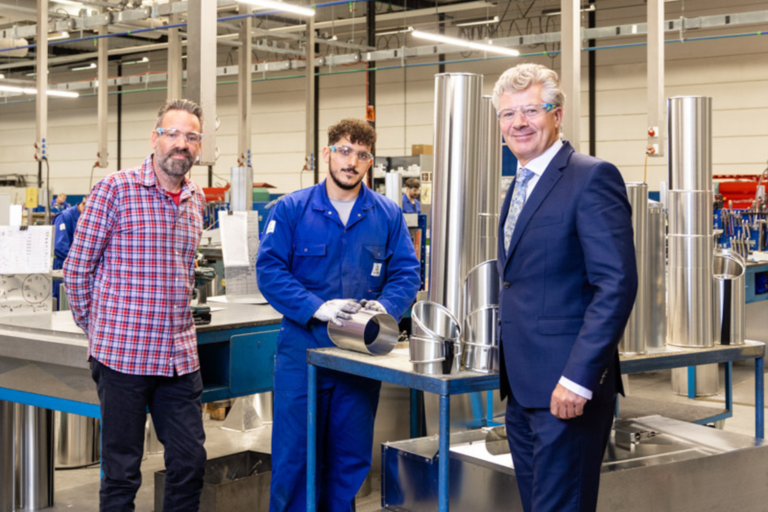
Only with confidence do we break the labor market tightness
The shortage of technical workers has been alarming for some time. On top of that, the intake at various technical colleges remains below par. This does not bode well for the future. How can we break through this and solve the shortage? Bruno Hulders of Richtpunt Hamme technical school and Henrik Stevens, president of Da Vinci College, will discuss this.
'Until 2032, no improvement in the inflow of technical personnel is to be expected,' Bruno Hulders says. 'Because for every hundred industrial employees who retire, we expect 82 entrants. Many industrial companies are currently inhibited in their development. Simply because they cannot get enough work force.' To improve the inflow into technical vocational education, some "mission work" needs to be done, both feel. Bruno: ‘It's really partly about perception. My own son recently chose technical education. And even I still get told by friends, "your son is very intelligent, why is he "only" going to technical vocational education?" Unbelievable. At the same time, those same friends of mine know quite well that if they need a craftsman at home, they have to pay a lot of money. So it has to do with prestige.’ Henrik Stevens agrees with Bruno: 'We will only solve the influx problem if the technical profession is held in higher esteem and paid well. But that's not enough. The young generation especially wants to work for an organization that is socially relevant. They want to make an impact and be able to grow. We have limited influence on this as education, but where we can give this development a boost together with industry, we are happy to play our part.’
VR in the classroom
The stature of technical education is improving thanks in part to innovation. For example, Bruno has noticed that the use of virtual reality in the classroom is very popular. 'We use VR in different ways, from history lessons to soon a virtual model of a column drill including all the safety rules and steps. And together with Bilfinger we are going to develop a model in which you can virtually weld.' Henrik: ‘The Da Vinci College, together with business and government, has the Sustainability Factory. This is a physical place where companies can take their innovations a step further. From innovation guidance to prototyping or the first steps to production. We have a factory and manufacturing halls with many facilities, from lathes to 3D printers and welding robots. That's definitely something that attracts attention.’ 'To make your mouth water,' Bruno responds. 'That's also what we're working toward in our region: a place where education, government and business work together to train young technicians and retrain the current generation of technical workers.'
Common pool
Until the influx balances with the demand for technical workers, it will continue to "struggle" for at least another decade. This is a serious message with which the industry must get to work, if it is up to Bruno and Henrik. And Henrik would like to make a suggestion in this regard: ‘I think it is very important that the industrial companies start finding each other in their investment programs. We really need to move toward "common pool" thinking in industry. So think about when you do your investments - for example, a turnaround - and how you can create a common pool of employees with whom you can do all that work. It means coordinating and jointly scheduling your work. The better you coordinate, the better you can use the common pool.' Bruno agrees: 'I think working together and sharing knowledge is the future. As a company, you have to get off your island. Many commercial companies still find that difficult. It requires a certain mindset, but it is a necessity.'
Trust
What ultimately matters is trust, Henrik believes. 'A common pool is only going to function well if people trust each other and genuinely want to help. Trust is the key word. The famous American political scientist Francis Fukuyama has previously established scientifically that where there is trust, people are more creative, give each other more space and innovate faster. And that is what we need in these tight times.
Henrik Stevens
Henrik Stevens studied at Erasmus University and received his doctorate from TU Delft. In 2011 he became director of the Maritime and Logistics College De Ruyter in Vlissingen and then of Techniek College Rotterdam. Recently, Henrik became chairman of the board of Da Vinci College: a regional training center for intermediate vocational education with over 220 MBO programs in the South Holland South region.
Bruno Hulders
Bruno Hulders studied mechanical design engineering and enjoyed working in sheet metal fabrication for fifteen years. He then became a welder-assembler until he no longer enjoyed it and made a switch to teaching. He became a mechanics teacher for turning and milling and a welding teacher. Three years ago he became innovation project supervisor to work with government and regional business to bring more and more innovation to schools. For this, he works with Bilfinger ROB, among others.

